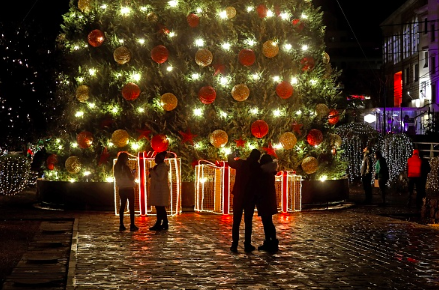
People in front of a Christmas tree at the port of Byblos.Dec. 9, 2019. (Credit: Joseph Eid/AFP)
As the run-up to the festive season approaches, retailers are still unsure what to expect. "While many of them have been stocking up since August or September, like those selling toys, Christmas decorations and clothing, they are now worried about their ability to sell their goods," said Nabil Fahed, Vice President of the Chamber of Commerce, Industry, and Agriculture of Beirut and Mount Lebanon (CCIAB).
This is a problematic situation for businesses that heavily rely on the festive season to survive. ‘Toy Market Trading’ holding, which includes companies like ‘Toys4Less,’ specializing in discounted toys, and the ‘JouéClub franchise,’ is one such business that usually generates nearly 60 percent of its revenue in the fourth quarter of the year.
"Normally, wholesale sales start in October, so that retailers have their stocks ready the following month. However, due to the renewed tensions at the border, demand has been negatively affected," noted its CEO, Wael Sinno. As a result, the holding recorded a 15 to 20 percent decrease in sales this October.
Slowed activity
Mona Salameh, manager and founder of the Hoda et Chocolat workshop, whose store typically makes 60 percent of its revenue during the holidays, echoed this story. After a sharp slowdown in October, "our sales are down by 50 percent in November, due to the fears of the Lebanese that the country will be caught up in the conflict in Gaza, so they prefer not to make these kinds of purchases, which they consider unnecessary. And for those who are buying at the moment, the average basket has dropped from $50 to $20," she explained.
Albert Haddad, co-manager of Wadih Haddad Jewellery, which generates between 30 percent and 40 percent of its sales during the festive season, agrees. "Given the circumstances and the fact that we are barely achieving 20-30 percent of the sales we used to make during this period, we have only prepared 60 percent of the stock we usually build up for the holidays," said. "Our end-of-year selection has been made with our customers' smaller budgets in mind,” he added.
Black Friday
In an attempt to reverse this downward trend, some retailers, like JouéClub, have decided to launch an "aggressive" sales campaign during Black Friday. "We're reducing our prices by 20-30 percent for nine consecutive days this year, which we used to do only for two or three days beforehand," explained Sinno. At first glance, the strategy seems to be paying off, and Sinno November sales are at the same level as last year.
"What's more, although this strategy reduces our profit margins, it allows us to renew our stock, which is a priority in our sector," he continued.
Noting that a number of professionals are doing the same, Nabil Fahed emphasized that this type of sales campaign is "a good way for retailers to boost demand for their products, clear their old stock and attract customers to their stores." However, he insisted on the exceptional nature of these initiatives. "Organizing long sales periods runs the risk of trivializing these events and reducing their appeal," he said.
Regarding their forecasts for December, a crucial month in the year, the three retailers interviewed were pessimistic and expected the downward trend of October and November to continue into December. "Of course, we hope to bounce back at the end of this year, but based on the results of the last two months, the situation does not seem very promising at the moment," said Albert Haddad.
Cautious optimism
"December's figures will depend on the return of expatriates and tourists, but based on the current trend we are expecting a 15 percent year-on-year decrease in our activity in December. On the other hand, if travelers return in large numbers for the festive season, everything could change," said Sinno.
This hope is shared by Jean Abboud, President of the Association of Travel and Tourism Agencies in Lebanon. "The level of bookings for this period is promising. Between 80 and 85 percent of the places available are already booked, bearing in mind that many Lebanese are used to booking at the last minute," he said. Abboud expects a total of around 300,000 visitors in December, a 10 percent decrease from the previous year.
But despite this decline, the overall trend is that foreign tourists are being replaced by Lebanese expatriates, whom shopkeepers are relying on for festive shopping. If the current trend continues, Abboud expects "a good number of Lebanese from the diaspora to return to the country for the festive season. This may also be the case for Arab tourists, but not for Europeans, who represented 40 percent of travelers in December 2022," he added.
So, it could be good news but "if the security situation were to deteriorate even further, Lebanese people might cancel their trips at the last minute," warned Fahed.
This article was originally published in French in L’Orient-Le Jour.